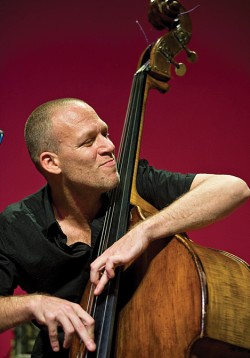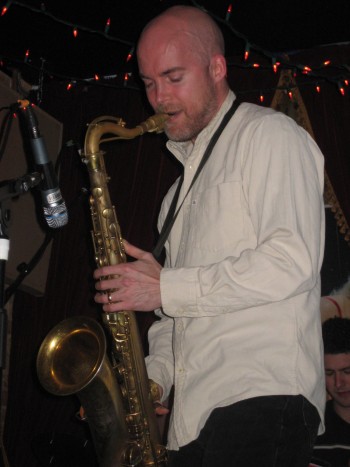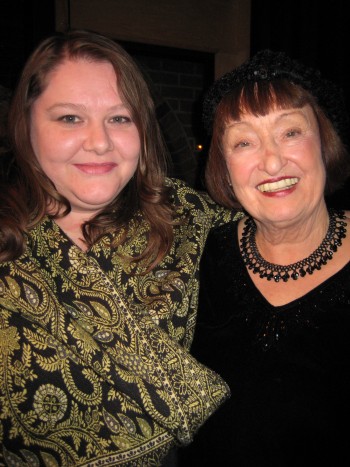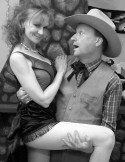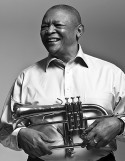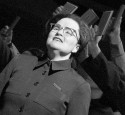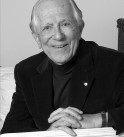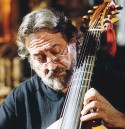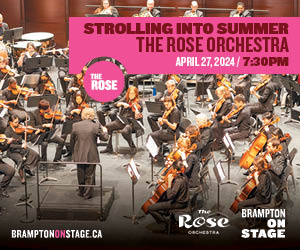As I write this, on return from a Sunday evening concert at the Orillia Aquatheatre, I'm reminded of the impending end of the summer concert season. Our concert began at 6:30pm rather than the usual seven o'clock, because the days are getting shorter. September is only two weeks away, and the fall season is on the horizon. For most community ensembles this marks a beginning of sorts. Whether they have been playing all summer, with rehearsals and concerts, or have taken a complete break, most will be in transition in some way or other. Almost without exception, there will be some reflection on the past year and discussion of what changes might be in order.
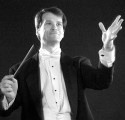 Almost every year in Southern Ontario, September heralds the establishment of one or more new community instrumental groups with varying aspirations. So, for our inauguration of a new season of The Wholenote, it seemed to be a fitting time to visit a few new startups and some relative newcomers that have now completed one or two seasons. For our very limited and informal study of recently formed groups, I've selected the Milton Concert Band, the Scarborough Society of Musicians, the Kindred Spirits Orchestra and the Newmarket Stepping Stone Band.
Almost every year in Southern Ontario, September heralds the establishment of one or more new community instrumental groups with varying aspirations. So, for our inauguration of a new season of The Wholenote, it seemed to be a fitting time to visit a few new startups and some relative newcomers that have now completed one or two seasons. For our very limited and informal study of recently formed groups, I've selected the Milton Concert Band, the Scarborough Society of Musicians, the Kindred Spirits Orchestra and the Newmarket Stepping Stone Band.
The oldest of this group, the Milton Concert Band began taking shape early in 2007, when recently arrived residents and long-time friends Angela Rozario and Cheryl Ciccarelli, having recognized the growing artistic community in Milton, decided to see if there were any other area amateur musicians interested in performing together. Their hopes were immediately met, and the pair were soon scrambling to accommodate over 30 musicians and having to put others on a waiting list. Working with the town of Milton, the group was able to move to its new permanent home at Memorial Arena in September 2007. By now, the band will have concluded their regular series of summer concerts and performances at town festivals, and will be preparing for their fall on Saturday mornings, at Dr. Norman Bethune C. I. In Scarborough.
About one year later, in February 2008, the Scarborough Society of Musicians had its beginnings. It began with the discussion among a group of graduating high school students who had developed and shared a passion for musical performance and didn’t want to abandon that love after graduation. The band is a non-profit organization aimed at providing post-secondary school students who are not pursuing professional studies in music an environment to continue developing and exploring their talents. Since its inception, the band has been rehearsing on Saturday mornings, in the music room at Dr. Norman Bethune C. I. In Scarborough. I’m informed that they’ll be organizing their future activities in January, but they have already performed a concert, in July 2010. Try visiting their website: continuingmusic.ca.
The next in our recent arrivals on the community music scene is the Kindred Spirits Orchestra. Founder and musical director Maestro Kristian Alexander felt that the time was ripe for an audition-based community orchestra in Markham. The orchestra’s official incorporation was on March 16, 2009. Their inaugural concert took place on November 3, 2009, at the CBC's Glenn Gould Studio in downtown Toronto. The programme included Wagner's Siegfried Idyll and Mozart's Gran Partita.
The orchestra is still relatively small (38 musicians), which has enabled it to concentrate on developing a refined ensemble sound. For the future they hope to increase the size of their string section and, in their words, “to grow and attract more musicians, more friends, more kindred spirits."
With a relatively small string section, to date they have focused almost exclusively on baroque and classical compositions. They are very eager to broaden their repertoire and approach romantic and more contemporary works. The first such foray into works requiring significantly larger resources took place in June of this year. At that time, I had the opportunity to join the brass section in a performance of Beethoven’s Fifth Symphony.
For the immediate future, their growth will certainly be limited until they can move to a larger rehearsal hall. Perhaps the new Markham recreational complex will supply the answer. In the meantime, they are forging ahead with an ambitious season that will include a four concert subscription series at the Glenn Gould Studio. Concerts will include guest violinist Jacques Israelievitch performing the Beethoven Violin Concerto, and performances of Beethoven’s Sixth, Seventh and Eighth symphonies.
In addition to performances, the Kindred Spirits Orchestra has an education and community outreach programme with professional development opportunities for local music teachers and young conductors. And to promote Canadian composers and music, they have Gary Kulesha and Larysa Kuzmenko on board as resident composers for the coming season.
About one year ago, a new band for beginners and intermediate level players was established in Newmarket. Informally called the Stepping Stone Band, their message was simple: “If you took band music in high school, and years later find you have time and interest in making music, this is perfect way to get back into it. Why play at home alone? The best way to learn to read music is to play in a group or ensemble.” The group stopped rehearsing for the summer, but that wasn’t the end of playing. Several members, who had upgraded their skills during this first season, are now rehearsing regularly with the Newmarket Citizens’ Band and have been performing in concerts over the summer. As for the remaining members, they will form the core for the coming season. As of this writing, this beginner band has 12 members who want to proceed with rehearsals in September. They are hoping for at least eight additional members to proceed with the programme. If you have considered the idea of taking up an instrument again or know of someone who has, pass this message on.
The band will meet Monday nights from 7pm to 9pm at a location in Aurora, near the Aurora Public Library. Members must bring their your own instruments and music stands. Music is provided. The program will be coordinated by Joe Mariconda. For more information, please email Joe at joemariconda@gmail.com or call him at 905-836-4039.
On the new initiative front, we have four very disparate endeavours, two of which specifically target seniors. The first of these, is yet another project of Joe Mariconda. The concept is to establish a concert band programme for the seniors of York Region, based in Newmarket. The Seniors’ Centre in Newmarket has a membership of 2,000 from which to draw. If the programme sparks the interest of sufficient members, there could well be more than one band to cater to various skill levels. The band (or bands) would rehearse on weekdays for two hours once a week. Instructing and conducting duties would be shared by a team of volunteer retired music teachers. With such a team approach, there would be less of a burden on any one individual conductor, and the participants would have the benefit of coaching by conductors with skills on a range of different instruments. Contact Joe Mariconda at 905-836-4039 or by email joemariconda@gmail.com.
Another new band programme for seniors will appeal to those who live close to the heart of Toronto. Long & McQuade Musical Instruments have announced their Play-in-a-Band Programme, to begin in September. Designed for adults from 50 to 90 (and older), it's for those who always wanted to play an instrument and former players who want to play again. Whether you're learning to play “from scratch” or dusting off that old horn from the back of the closet, you'll will be welcome. The programme will be directed by Dan Kapp, an instrumentalist and conductor with over 30 years' experience. An information meeting is scheduled for Wednesday, September 15 at 9:30am, with the first rehearsal one week later. For information go to www.newhorizonsbloor.ca or phone 416-588-7886.
This announcement sparked my curiosity and prompted a bit of digging, since there was a Canadian Federal Government sponsored “New Horizons” program in Canada over 25 years ago. The New Horizons program, established in 1991, was the brain child of Dr. Roy Ernst at the Eastman School of Music in Rochester, New York. While the first New Horizons program in 1991 was for bands, the intent was to also start other kinds of New Horizons programs. New Horizons orchestras started a few years later. Initially, a minimum age of 50 was arbitrarily set as a guideline. Over the years that has changed. Now, for most groups, “If you consider yourself to be an adult, you’re eligible.” In my digging, I discovered that there were already no fewer than ten such groups in Ontario as members of the New Horizons International Music Association. I even learned that two of these were conducted by personal friends of mine.
Just North of Toronto a group of dedicated amateur musicians have decided that it's time to formally organize a concert band for the town of Richmond Hill. The Richmond Hill Concert Band is intended for adults with high school instrumental musical ability who may not have played for several years but are looking to regain the enjoyment of playing in a band. The origins of this group are quite creative. The Thornhill Community Band, which has been operating successfully for some years, realized that 30 percent of its members were residents of nearby Richmond Hill. It was also becoming apparent that the Thornhill band's numbers had grown to the point where they could no longer accept new members for some instruments.
The solution was to assist in the forming of a new band. This had a number of benefits. By rehearsing on a complementary night to its own rehearsals, the Thornhill Band could help mentor a new Richmond Hill band without detracting from its own organization and membership. A core group from the Thornhill band, willing to rehearse two nights a week, will ensure a balanced instrumentation at the beginning. Initially they will share the music library, and long-time experienced conductor Denny Ringler will be at the helm of both ensembles. Since a group must have charitable status to apply for an Ontario Trillium grant, and since the Thornhill Community Band is a registered charitable organization, it was eligible to apply for a grant for its progeny. They are awaiting the outcome.
To assist in its establishment, the band was awarded a grant of $2,500 for startup funding by the Richmond Hill Mayor’s Endowment Fund. The band will rehearse Thursday evenings from 7:30 to 10pm starting September 16, 2010, in the music room at Roselawn Public School, 422 Carrville Rd, Richmond Hill. For information, please call 905-737-7265, 416-223-7152, or send an email to info@rhcb.ca.
The fourth of our new startup groups is Resa’s Pieces Strings. In previous issues we have referred to the very successful beginners' band know as Resa’s Pieces Concert Band. Established some years ago by Resa Kochberg, this band was created with the philosophy that “everyone grows musically together, with each "piece" completing the whole. Now, Resa has decided that former and/or new string players deserve the same opportunity to develop their skills. As a result, Resa's Pieces Strings or the RPS will be launched in September 2010. This new beginners' string ensemble will be under the directorship of Ric Giorgi.
The RPS will follow the same philosophy that Resa Kochberg established when she founded Resa's Pieces Concert Band some years ago. It is "to provide an opportunity for people to return to playing instruments that they had not touched for years.” If I thought that I could handle a string instrument, I would be there in a flash with a viola in hand. For information visit their website, http://www.resaspieces.org, or email strings@resaspieces.org.
With all of those opportunities available, if you have thought about getting back to music, there is no better time than now. Listen to the advice from Resa. “Recall those sounds, reawaken that talent, rediscover playing music!”
On a sombre note, it is with deep regret that we report the passing of a stalwart of the military reserve band scene in Toronto. Captain Frank Merlo, CD, OSJ, Director of Music for the Governor General’s Horse Guards Regimental Band, passed away in Toronto on July 6, 2010. Frank’s association with the regiment and the band began in 1979, and for over three decades he literally dedicated his life to both. I first met Frank when he, as a young French horn player, first became involved in the local band scene. In part his obituary stated: “As the current Senior Director of Music in 32 Brigade, his knowledge and advice was highly sought after, and the support he gave to each Commanding Officer ensured that the Regimental Band could always be counted on to provide the right ceremonial touch to any occasion. In his role as a vocal music teacher with Toronto District Catholic School Board, he influenced the musical lives of countless students. He will be missed.
Definition Department
This month’s lesser known musical term is FERMANTRA: "A note held over and over and over . . ." We invite submissions from readers.
Coming Events: Please see the listings section for full details.
Jack MacQuarrie plays several brass instruments, and has performed in many community ensembles. He can be contacted at: bandstand@thewholenote.com.
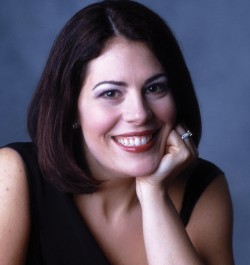 The obsession with elephants and Aida in the popular imagination points to the central difficulty in staging the opera. Despite all the notions of spectacle the opera is in fact an intimate work about the complications of love and power involving only four characters. This is the aspect that director Tim Albery will emphasize. According to the COC, “In approaching Aida, Albery has taken note of how many private, intimate scenes are placed in the context of a society of great power, wealth, expansiveness and nationalism, and has considered how these characteristics are reflected in the societies of our own times. He has set the opera in a luxurious and ostentatious palace in an unspecified war-torn country. The lavish opulence of the surroundings will stand in contrast to the fundamental intimacy of many of the opera’s most important scenes.”
The obsession with elephants and Aida in the popular imagination points to the central difficulty in staging the opera. Despite all the notions of spectacle the opera is in fact an intimate work about the complications of love and power involving only four characters. This is the aspect that director Tim Albery will emphasize. According to the COC, “In approaching Aida, Albery has taken note of how many private, intimate scenes are placed in the context of a society of great power, wealth, expansiveness and nationalism, and has considered how these characteristics are reflected in the societies of our own times. He has set the opera in a luxurious and ostentatious palace in an unspecified war-torn country. The lavish opulence of the surroundings will stand in contrast to the fundamental intimacy of many of the opera’s most important scenes.”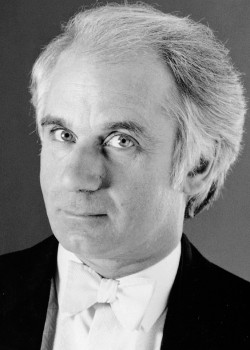 Richard Bradshaw used to refer to the Britten operas he presented as part of the COC’s “Britten series,” and it’s heartening to see that Neef is continuing that notion. Let’s hope this is not the end of it. We’ve never had Owen Wingrave (1970) – and is it too much to hope for Gloriana (1953)?
Richard Bradshaw used to refer to the Britten operas he presented as part of the COC’s “Britten series,” and it’s heartening to see that Neef is continuing that notion. Let’s hope this is not the end of it. We’ve never had Owen Wingrave (1970) – and is it too much to hope for Gloriana (1953)?

